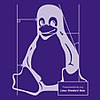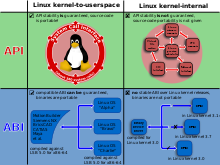Linux Standard Base
| Linux Standard Base
|
|
|---|---|

|
|
| Basic data
|
|
| developer | Linux Foundation |
| Current version | 5.0 (June 3, 2015) |
| operating system | Linux |
| category | Binary interface |
| German speaking | No |
| Linux Foundation - LSB | |
The Linux Standard Base ( LSB ) is a working group of the Linux Foundation that was set up in the late 1990s. The LSB defines standards for binary interfaces , program libraries and other operating system components with the aim of ensuring compatibility between the various Linux distributions , e.g. B. with regard to the runnability of programs. To date, only a small number of Linux distributions meet the requirements of the LSB, and the requirements are not yet comprehensive enough to define a complete operating system platform.
motivation
In the course of the history of Linux , a number of different Linux distributions have developed which pursued different approaches in many details, such as incompatible software package formats, different directory structures or different versions of the integrated software packages. As a result, independent software providers ( ISVs ) are forced to adapt their software specifically for each distribution (or have it adapted) and offer it separately, which is an enormous additional expense.
concept
The aim of the LSB is to use standards and guidelines to create a uniform, binary-compatible platform for software installations under Linux. She makes u. a. Specifications which basic programs and program libraries must be available on an LSB-compliant system and defines a directory structure in accordance with the file system hierarchy standard . The basis of the LSB standards were the POSIX and Single UNIX Specification standards , which were expanded. Meanwhile, however, the LSB standard differs in some aspects specific to Linux by the Open Group - Unix from standards.
history
The LSB project, launched at the end of the 1990s, initially wanted to fully comply with the POSIX and Single UNIX Specification standards and only expand them in a few places, which is why the Open Group had offered to carry out certification for one US $.
POSIX incompatibility
In 2005, however, the LSB began to insist on not eliminating certain deviations ( incompatibility ) that are common in Linux distributions . Since then, there has been no progress in the process of achieving UNIX standard conformity; the goal of full POSIX and SUS conformity seems to have been abandoned in favor of the conventional conventions in existing Linux systems. On the contrary, Linus Torvalds has repeatedly made it clear that he is willing to diverge from POSIX if there are good reasons to do so.
Drepper criticism
In 2005, the LSB of was glibc - maintainer Ulrich Drepper criticized as ineffective, specifically he complained erroneous test suites. Jeff Licquia of LSB admitted that tests were incomplete and code was flawed, but the tests were still meaningful. In addition, there is no alternative to defined and verifiable standards for a free, interoperable software market.
Versions
The first version 1.0 of the LSB comprised older, more widespread standards. At the beginning of January 2004 the LSB was presented to the International Organization for Standardization (ISO) for the first time . The subsequent version 2.0 supported more architectures. The LSB 3.0 is characterized by updates to the existing standards. At the beginning of November of the same year it was announced that the ISO had recognized the LSB as an international standard. The approved version is version 2.0.1. Newer versions of the LSB are to follow.
Overview table
| version | date | Major innovations |
|---|---|---|
| 1.0 | July 1, 2001 | |
| 2.0 | September 15, 2004 |
|
| 3.0 | September 19, 2005 |
|
| 3.1 | October 31, 2005 | |
| 3.2 | January 28, 2008 | |
| 4.0 | November 11, 2008 |
|
| 4.1 | March 3, 2011 | |
| 5.0 | 3rd June 2015 |
|
Web links
- Homepage of the LSB (English)
- ISO specifications of the LSB (English)
- Overview of all LSB specifications (English)
- Building Applications with the Linux Standard Base (PDF Download) Manual for Developing LSB Compliant Software
Individual evidence
- ↑ a b c d e Eric Brown: LSB 4.0 certifications aim to heal Linux fragmentation ( English ) linuxfordevices.com. December 8, 2010. Archived from the original on December 24, 2013. Info: The archive link was automatically inserted and not yet checked. Please check the original and archive link according to the instructions and then remove this notice. Retrieved November 16, 2011: “The LSB spec outlines interoperability between applications and the Linux operating system, 'allowing application developers to target multiple versions of Linux with just one software package,' says the LF. Launched in the late '90s, the LSB working group released its first major LSB 1.1 specification in 2001. [...] "
- ^ Eskild Hustvedt: Playing well with distros ( English ) Linux Game Publishing . November 24, 2009. Archived from the original on September 21, 2011. Retrieved January 15, 2012.
- ↑ Miguel de Icaza : Linux and Independent Software Vendors ( English ) primates.ximian.com. November 4, 2003. Archived from the original on July 15, 2012. Info: The archive link was automatically inserted and not yet checked. Please check the original and archive link according to the instructions and then remove this notice. Retrieved on April 7, 2012: "[...] staffing requirements for maintaining and testing [...] software for a dozen of distributions and release versions quickly becomes a big burden [...]"
- ^ Conflicts between ISO / IEC 9945 (POSIX) and the Linux Standard Base (English) - OpenGroup report , August 20, 2005
- ↑ Linus Torvalds : Re: RFD: x32 ABI system call numbers. August 31, 2011, accessed on September 6, 2011 (English): “POSIX has been wrong before. Sometimes the solution really is to say 'sorry, you wrote that 20 years ago, and things have changed'. "
- ↑ Tim Schürmann: Linux Standard Base 3.0 software according to standard dimensions . In: Linux Magazine 2006/01 . linux-magazin.de. P. 10. January 1, 2006. Retrieved February 12, 2012.
- ↑ Ulrich Drepper: Do you still think the LSB has some value? ( English ) udrepper.livejournal.com. September 17, 2005. Retrieved February 12, 2012: “There are still people out there who think that the LSB has any value. This just means they buy into the advertisement of the people who have monetary benefits from the existence of the "specification", they don't do any research, and they generally don't understand ABI issues. "
- ↑ Jeff Licquia: Yes, the LSB Has Value ( English ) September 27, 2005. Retrieved February 12, 2012.
- ↑ Linux Standard Base 2.0 released
- ↑ Linux Standard Base 3.0 released
- ↑ LSB 3.1 with better desktop support
- ↑ Linux Standard Base 3.2 with ALSA support
- ↑ First beta of Linux Standard Base 4.0
- ↑ Linux Foundation: Linux Standard Base 4.1 without Java - Article at Golem.de , from March 11, 2011
- ↑ Long-awaited updates for Linux standards published - Article at Golem.de , June 4, 2015
